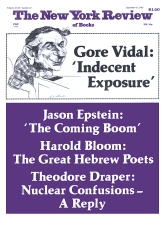In response to:
The Supply-Side Star from the April 1, 1982 issue
To the Editors:
Although I found Robert Mazzocco’s analysis of Clint Eastwood in “The Supply Side Star” [NYR, April 1] to be excellent in capturing the various political colorations within Eastwood’s enigmatic characters, there were, nonetheless, two slightly embarrassing mistakes:
At the end of the movie, Butch Cassidy (Paul Newman) and the Sundance Kid (Robert Redford) are not shot down by the “Mexican militia” as Mr. Mazzocco says. It’s the Bolivian militia.
In the next paragraph, Mr. Mazzocco quotes H. Rap Brown’s famous remark about violence being “as American as apple pie.” Actually, Mr. Brown said “violence is as American as cherry pie.”
Pedantic points, to be sure, but these slipups are disappointing, given Mr. Mazzocco’s display of his thorough knowledge of the late 1960s and early 1970s in relationship to Clint Eastwood’s films and their cultural context.
Jerome C. Weeks
Third Coast Magazine
Austin, Texas
Robert Mazzocco replies:
Yes, I should have remembered that Butch and the Kid and Etta his girl went to South America, not just south of the border; and I’ll take it on faith that Weeks is also correct about Brown, since he offers no attribution for the quotation in his letter. Still, even if it’s true that Newman and Redford are slaughtered by the Bolivian militia (at San Vicente) and not by the Mexican militia, and even if it’s true that Brown said “violence is as American as cherry pie” and not “violence is as American as apple pie,” of what importance can the notation of these errors have to the two long and complex sentences in which the words “Mexican militia” and “apple pie,” respectively, occur? Surely the meaning of the sentences remains unaltered, as do the points made in both.
This Issue
September 23, 1982



